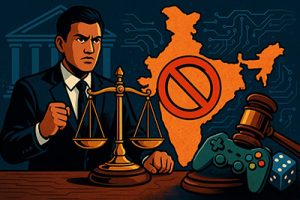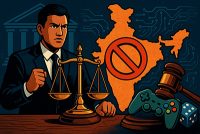
India’s online gaming industry, once a rapidly expanding market fueled by billions in foreign investment, is now facing unprecedented disruption after the implementation of the Promotion and Regulation of Online Gaming Act, 2025. The sweeping legislation, passed by Parliament and signed by President Droupadi Murmu, imposes a blanket ban on all money-based online games, sparking the sector’s first legal battle led by A23.
A23’s Petition Against the Ban
A23, a leading operator in India known for its online rummy and poker offerings, has filed a petition with the Karnataka High Court. The case, lodged by its parent company, Head Digital Works, on August 28, challenges the law’s broad application. In its filing, A23 argued that the legislation “criminalises the legitimate business of playing online games of skill, which would result in the closure of various gaming companies overnight.” The company further criticized the law as a “product of state paternalism,” urging the court to deem it unconstitutional for skill-based platforms.
A23, which claims a user base exceeding 70 million registered players, is seeking judicial relief to safeguard its operations and those of other similar operators. As of now, the Ministry of Electronics and Information Technology has not commented on the ongoing legal proceedings.
The ban has already had a significant impact on the market. Platforms such as Dream11, Mobile Premier League (MPL), My11Circle, WinZO, Zupee, and PokerBaazi have either suspended or completely shut down their money-based games.
Immediate Fallout Across the Industry
The abrupt enforcement of the Act sent shockwaves throughout the $3.7 billion gaming industry, which was projected to grow to $9.1 billion by 2029, according to the India Gaming Report 2025. Global investors, including Tiger Global and Peak XV Partners, have invested close to $3 billion in the sector over the past five years, underscoring India’s emergence as one of the largest gaming markets worldwide.
Dream11, a major fantasy sports platform, has been particularly hard-hit. CEO Harsh Jain told CNBC TV18, “95% of our group’s revenues have disappeared overnight,” but added that the company has no plans to contest the new law. Similarly, MPL announced it would not pursue legal action, instead pivoting its business strategy toward free-to-play models to remain operational.
Gameskraft, another notable player in the real-money gaming space, echoed this sentiment. In a statement, the company emphasized its compliance with the legislation: “As a responsible and law-abiding corporate entity, Gameskraft has no intention of pursuing any legal challenge to the legislation. We fully respect the legislative process and remain committed to operating within the framework of the law.”
The company also confirmed that it has paused ‘Add Cash’ and gameplay services on its popular rummy apps, including RummyCulture, while initiating internal discussions on future strategy. Despite the financial blow, Dream11 has clarified that no layoffs are currently planned.
Divided Perspectives on the Ban
The online gaming sector’s reaction to the Act is deeply divided. Proponents argue the ban is a critical step toward addressing the rise in gambling addiction, fraud, and money laundering associated with money-based online games. Critics, however, say the legislation is overly broad and risks stifling innovation while jeopardizing thousands of jobs in a high-growth industry.
Ananay Jain, a Partner at Grant Thornton Bharat, described the legislation as a “double-edged sword,” noting that while it provides regulatory clarity, it “risks stifling innovation and burdening startups” that had thrived under a previously open market structure.
Industry associations, including the All India Gaming Federation (AIGF), the E-Gaming Federation (EGF), and the Federation of Indian Fantasy Sports (FIFS), have jointly appealed to Home Minister Amit Shah. They highlighted the sector’s estimated valuation of Rs 2 lakh crore and annual revenues of more than Rs 31,000 crore, warning of significant economic setbacks, job losses, and declining tax contributions.
Observers have also noted the potential unintended consequences of the ban, such as the rise of offshore platforms stepping in to fill the gap left by regulated domestic operators. Although these offshore sites face heavy taxation, the lack of domestic competition may allow them to dominate India’s real-money gaming market.
As the legal battle unfolds, A23’s petition represents the industry’s first major attempt to challenge the government’s hardline stance on online money-based gaming, with the outcome expected to shape the future of skill-based platforms across the country.
Source:
A23 leads legal battle against India’s online gaming ban, news.worldcasinodirectory.com, August 28, 2025.

